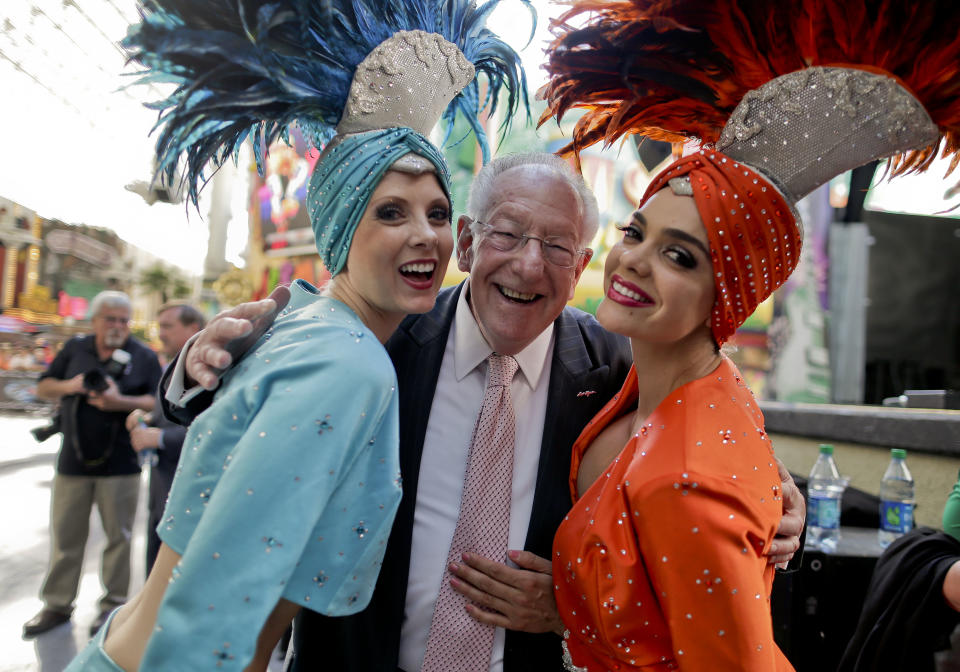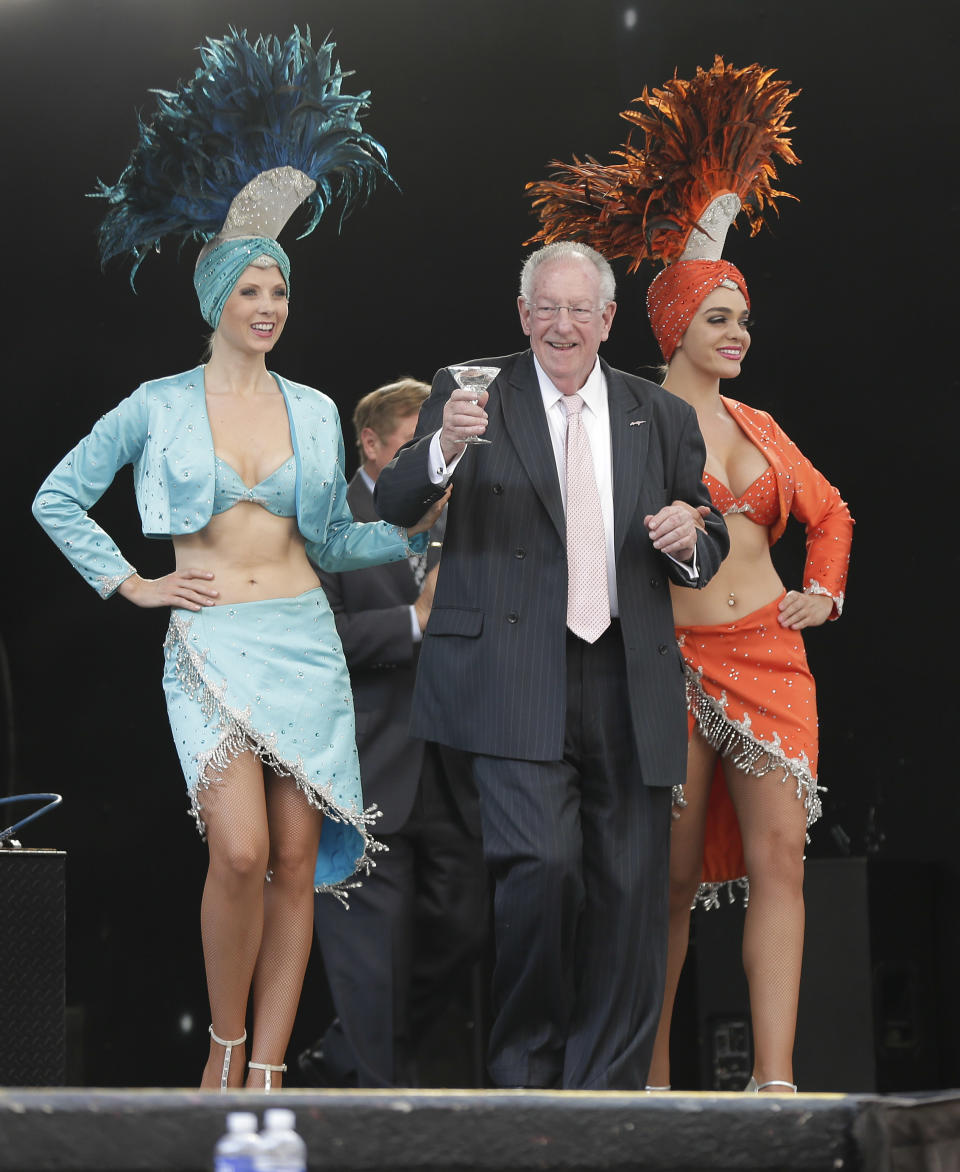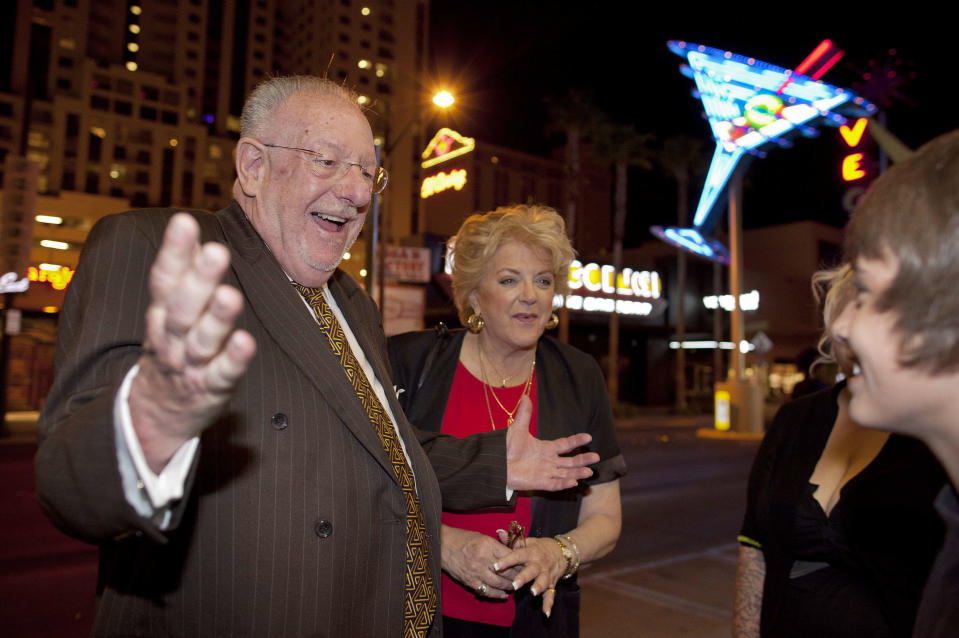Charismatic Las Vegas mob lawyer mayor pens memoir
LAS VEGAS (AP) — Oscar Goodman ran Las Vegas for 12 years with a showgirl on his arm and a martini in his fist.
A former mob lawyer, he promoted his city and himself with antics that lent credibility to his self-given title of "Happiest mayor in the universe."
Now, two years into a semi-retirement, Goodman has written a memoir about his career representing figures out of Martin Scorsese films, his three terms in office and his continuing role as Sin City's cheerleader-in-chief.
There are no real bombshells here, but the book reads like a relaxed tour of Las Vegas from the mob era to the present day, with a tipsy gossip by your side.
It's all part of the continued branding of one of Las Vegas' most colorful and defining characters.
In "Being Oscar: From Mob Lawyer to Mayor of Las Vegas — Only in America" released by Weinstein Books on Tuesday, Goodman uses the same jocular, unapologetic tone he employed during his martini mayorship.
As mayor, Goodman advocated cutting off the thumbs of graffiti vandals. He secured an official sponsorship from Bombay Sapphire gin.
In the book, the 73-year-old father of four grouses about sneaky FBI tactics, attempts a rapprochement with casino mogul Sheldon Adelson and calls a group of police officers lying pieces of ... well, a word politicians outside of this sin-drenched city would be well-advised to avoid.
As is often the case with Goodman, it is difficult to know where the man ends and his persona begins.
On a recent afternoon at the sprawling Las Vegas home he has shared with his wife since 1976, a bearded and bespectacled Goodman acknowledged he may have lost track of that distinction himself.
He said he needed his bluster during his 35 years representing some of the nation's most notorious mob figures, including Anthony "Tony the Ant" Spilotro, famously portrayed by Joe Pesci in the movie "Casino."
"It was David and Goliath," he said. "I walked into court by myself, and there was an entourage of prosecutors against me. I had to have that kind of personality because I could never show any weakness. If I showed weakness, they would eat my clients alive."
Goodman writes about his efforts to remain apart from his underworld clients. But he did pick up some of their habits and trappings, including a policy against representing "rats" and the dark, pinstripe suits he still wears to this day.
In 1999, Goodman gave up his multimillion-dollar job as an attorney to enter politics, and quickly became one of the most flamboyant and recognizable elected officials in the land.
The Las Vegas mayor's office is relatively weak — one of seven equal votes on the City Council — but Goodman used the showmanship that served him so well in the courtroom to infuse the position with something approaching rock star status.
He famously demanded an apology from President Barack Obama for speaking derisively about Las Vegas casinos in the context of encouraging belt-tightening, and took steps to establish a mob museum, which now memorializes a part of Las Vegas lore that many would just as soon forget.
Goodman also performed official duties, including the state of the city address, flanked by sequin-drenched showgirls and with a bottomless cocktail within easy reach. Both props make an appearance on the cover of his book.
He writes that these antics were all in the service of his overarching goal: to revitalize downtown, a dilapidated stretch of older casinos a few miles north of the Strip. Goodman is widely acknowledged to have helped bring about the area's hipster renaissance.
"Because I was the mob lawyer who was turned mayor, people listened, and the phone, which had not rung, began to ring," he said.
Again, it is difficult to square the hard-drinking persona that Goodman presents with what he was able to accomplish. He writes that while in office, everyone knew not to call him after 5 p.m. because he wouldn't remember the conversation. He also says he wrote the memoir in longhand, being "completely computer illiterate."
Not everyone was won over by the Goodman charm.
When he announced his candidacy, the Las Vegas Review-Journal ran an editorial headlined "Anybody but Oscar."
But through it all, the outlandish comments and habits that would have made him unelectable anywhere else only fed his popularity in Vegas. He was easily re-elected twice, and left office in 2011 after term limits prevented him from making another bid. His wife ran and successfully replaced him.
In his new role as memoirist, Goodman stays true to the mantra of self-indulgence that made him a perfect mascot for his town. Anyone looking for soul-searching and self-reflection will come away empty handed.
"It's a funny thing when you say it out loud, but I always liked myself," Goodman writes.
Do readers really need to know a list of his most illustrious classmates at Haverford College in Pennsylvania? His bar exam grade? That he loves his parents very much, and that they helped make him who he is?
Goodman knows the haters are out there, and he doesn't seem to care.
"I was never in doubt, and I know that bothered some people," he writes. "It's who I am."
Goodman continues to draw adoring crowds as the town's official ambassador, and spends enough time at official events to spark rumors of a shadow mayorship. The book, he writes, is an effort to stay relevant.
As the clock ticked down toward his five o'clock martini, a collection of Oscar Goodman bobblehead dolls — one of his trademarks — nodded from a bookshelf near the big screen television. Photos of Goodman posing with various dignitaries while holding various drinks winked from the tabletops.
Goodman said there is one trophy he feels he's still missing: a biopic. But he's confident his memoir will be turned into a film.
You don't get to be the happiest mayor in the universe by second-guessing these things.
___
Hannah Dreier can be reached at http://twitter.com/hannahdreier.




